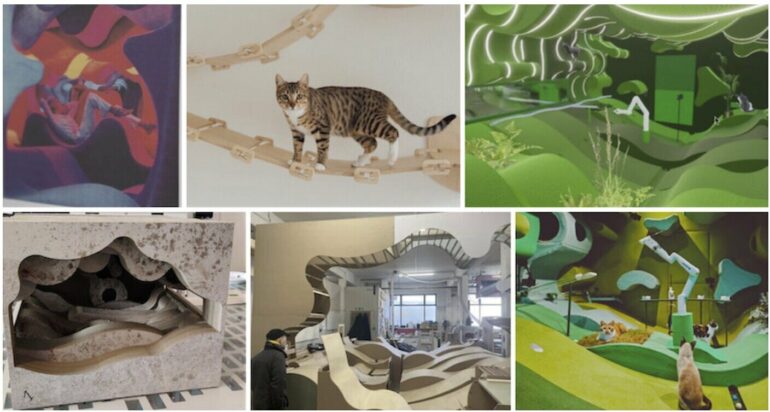Would you trust a robot to look after your cat? New research suggests it takes more than a carefully designed robot to care for your cat, the environment in which they operate is also vital, as well as human interaction.
Cat Royale is a unique collaboration between Computer Scientists from the University of Nottingham and artists at Blast Theory who worked together to create a multispecies world centered around a be-spoke enclosure in which three cats and a robot arm coexist for six hours a day during a twelve-day installation as part of an artist-led project. The installation was launched in 2023 at the World Science Festival in Brisbane, Australia and has been touring since, it has just won a Webby award for its creative experience.
The research paper, “Designing Multispecies Worlds for Robots, Cats, and Humans” has just been presented at the annual Computer-Human Conference (CHI’24) where it won best paper. It outlines how designing the technology and its interactions is not sufficient, but that it is equally important to consider the design of the “world” in which the technology operates. The research also highlights the necessity of human involvement in areas such as breakdown recovery, animal welfare, and their role as audience.
The study is also published in Proceedings of the CHI Conference on Human Factors in Computing Systems.
Cat Royale centered around a robot arm offering activities to make the cats happier, these included dragging a “mouse” toy along the floor, raising a feather “bird” into the air, and even offering them treats to eat. The team then trained an AI to learn what games the cats liked best so that it could personalize their experiences.
“At first glance, the project is about designing a robot to enrich the lives of a family of cats by playing with them,” commented Professor Steve Benford from the University of Nottingham who led the research. “Under the surface, however, it explores the question of what it takes to trust a robot to look after our loved ones and potentially ourselves.”
Working with Blast Theory to develop and then study Cat Royale, the research team gained important insights into the design of robots and its interactions with the cats. They had to design the robot to pick up toys, deploy them in ways that excited the cats, while it learned which games each cat liked. They also designed the entire world in which the cats and the robot lived, providing safe spaces for the cats to observe the robot and from which to sneak up on it, and decorating it so that the robot had the best chance of spotting the approaching cats.
The implication is designing robots involves interior design as well as engineering and AI. If you want to introduce robots into your home to look after your loved ones, then you will likely need to redesign your home.
Research workshops for Cat Royale were held at the University of Nottingham’s unique Cobotmaker Space where stakeholders were brought together to think about the design of the robot /welfare of cats.
“As we learned through Cat Royale, creating a multispecies system—where cats, robots, and humans are all accounted for—takes more than just designing the robot. We had to ensure animal well-being at all times, while simultaneously ensuring that the interactive installation engaged the (human) audiences around the world.
“This involved consideration of many elements, including the design of the enclosure, the robot and its underlying systems, the various roles of the humans-in-the-loop, and, of course, the selection of the cats,” said Eike Schneiders, Transitional Assistant Professor in the Mixed Reality Lab at the University of Nottingham.
More information:
Eike Schneiders et al, Designing Multispecies Worlds for Robots, Cats, and Humans, Proceedings of the CHI Conference on Human Factors in Computing Systems (2024). DOI: 10.1145/3613904.3642115
Provided by
University of Nottingham
Citation:
Cat collaboration demonstrates what it takes to trust robots (2024, May 13)



